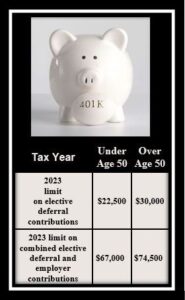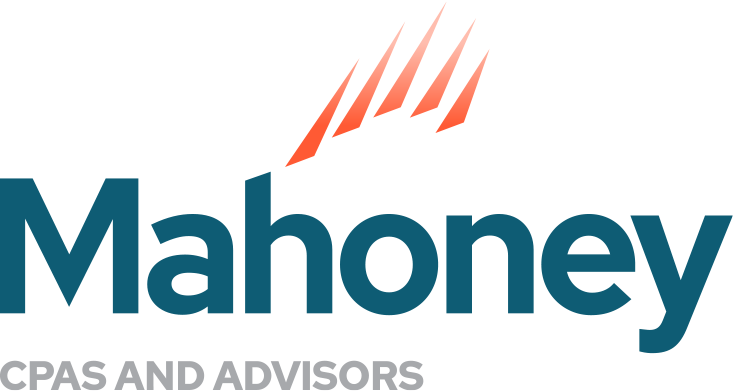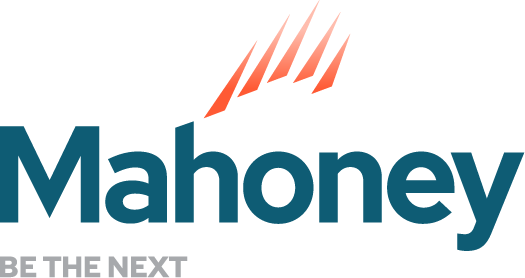
Go It Alone With a 401K Plan
 If your business is essentially a one-person operation, there’s an option to help you save more money for retirement: The Solo 401(k) plan.
If your business is essentially a one-person operation, there’s an option to help you save more money for retirement: The Solo 401(k) plan.
Ordinarily, traditional defined contribution retirement plans allow annual contributions that are limited to either 25% of salary if you’re employed by your own S or C corporation or 20% of self-employment income if you operate as a sole proprietor or single-member LLC. Also, traditional profit-sharing plans, Keogh or SEP plans are subject to a $67,000 cap on contributions to your account for 2023 (up from $61,000 in 2022).
Not bad, but with a Solo 401(k) plan, you can probably make substantially larger contributions that lower your tax bill and generate more tax-deferred earnings for retirement.
A Solo 401(k) is made up of two separate parts. Together, the two parts make the plan advantageous:
1. Elective deferral contribution. As much as 100% of the first $22,500 of your 2023 salary or self-employment income can be put into an account ($20,500 in 2022). That amount increases to $30,000 if you are 50-years-old or older at year end.
2. Additional employer contribution. Your employer (your company or you personally, if you are self employed) can contribute an additional 25% of your salary or 20% of your self-employment income.
The sum of the two parts is capped at 100% of your annual employee compensation or self-employment income, or $67,000 in 2023, whichever is smaller (up from $61,000 in 2022). However, the dollar cap is increased to $74,500 for people age 50 or older.
A Solo 401(k) doesn’t force you to contribute more than you can comfortably afford: The plan lets you rack up major tax savings in good years, by making maximum contributions, but gives you the option of contributing less — or even nothing — in lean years when you need to conserve cash.
Plus, you generally get the benefits of traditional 401(k) plans, such as the ability to borrow from your account.
Establishing and operating any 401(k) plan means some up-front paperwork and ongoing administrative effort. With a Solo 401(k), however, the administrative work is simplified since you are the only participant.
There are a couple of caveats:
- If you earn a very high income and are younger than 50, the Solo 401(k) may not permit larger contributions than a traditional plan because of the dollar cap on annual contributions to $67,000 for 2023. In general, you should only set one up if it allows significantly larger contributions because a Solo 401(k) costs more to operate.
- If you have employees, you may also have to contribute to their accounts. In this case, you have a regular 401(k) plan that is subject to some complex rules.
Contact your Mahoney tax advisor to sort out the complexities of various retirement plans and determine whether a Solo 401(k) is right for you.
© 2023
Allowable Contributions Can Add Up
Annual elective deferral and employer contributions to a solo 401(k) can add up to big numbers. To illustrate, consider the following examples.
Example 1: Employee-Owner Lisa
Lisa, age 40, is the only employee of her corporation. (It makes no difference whether it’s a C or S corporation). In 2023, the corporation pays Lisa a salary of $80,000. The maximum contribution to a solo 401(k) plan set up for Lisa’s benefit is $40,500. That amount is composed of:
- Lisa’s $22,500 elective deferral contribution, which reduces her taxable salary to $57,500, and
- A $20,000 employer contribution made by the corporation (25% x Lisa’s $80,000 salary).
The employer contribution has no effect on Lisa’s taxable salary, but it reduces her corporation’s taxable income by $22,500. The $40,500 is significantly higher than the $20,000 maximum contribution (25% x Lisa’s $80,000 salary) that would be allowed with a traditional defined contribution plan, such as a SEP or profit-sharing plan. The $22,500 difference is due to the solo 401(k) elective deferral contribution privilege.
Example 2: Self-Employed Len
Len, age 45, operates his business as a sole proprietorship. In 2023, Len has $80,000 of self-employment income. For 2023, the maximum allowable deductible contribution to a solo 401(k) plan set up for Len’s benefit is $38,500. That amount is composed of:
- A $22,500 elective deferral contribution, and
- A $16,000 employer contribution (20% x Len’s $80,000 of self-employment income).
The $38,500 amount is significantly higher than the $16,000 maximum contribution (20% x Len’s $80,000 of self-employment income) that would be allowed with a traditional self-employed plan, such as a SEP. Again, the $22,500 difference is due to the solo 401(k) elective deferral contribution privilege.
ADDRESS
10 River Park Plaza, Suite 800
Saint Paul, MN 55107
(651) 227.6695
Fax: (651) 227.9796
info@mahoneycpa.com
© 2024 Mahoney | Privacy Policy
Mahoney Ulbrich Christiansen & Russ, PA



